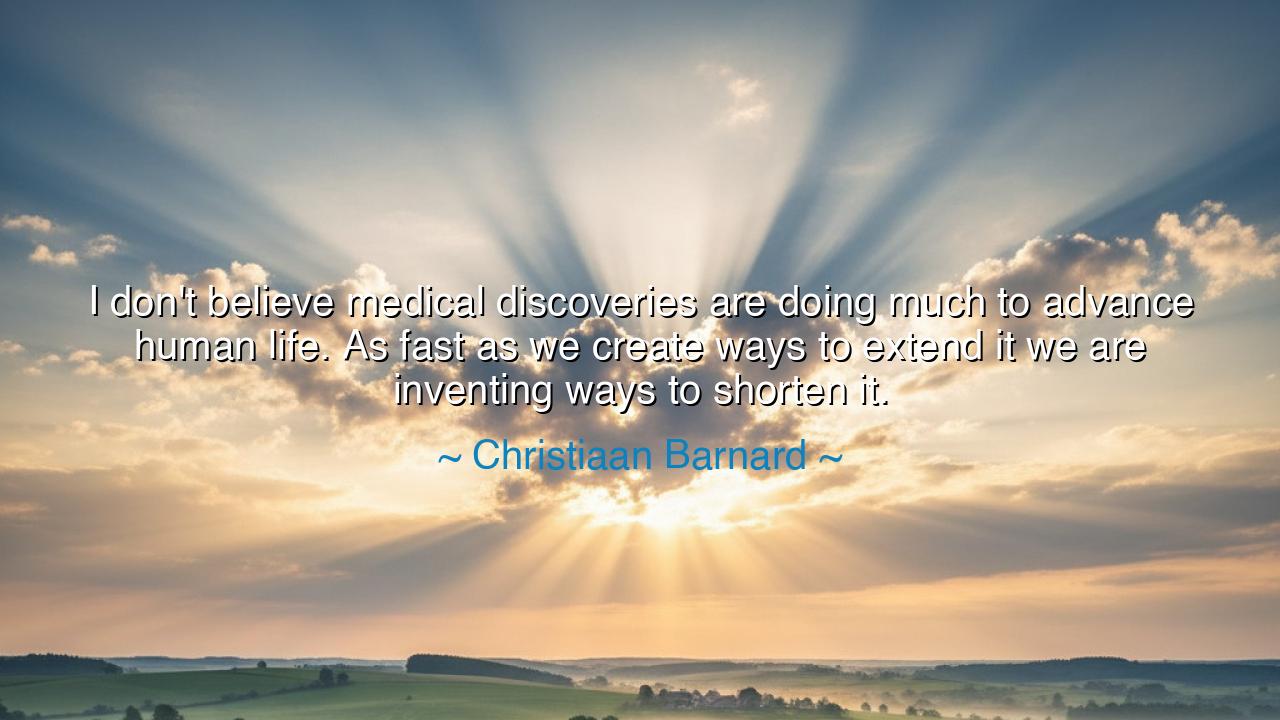
I don't believe medical discoveries are doing much to advance
I don't believe medical discoveries are doing much to advance human life. As fast as we create ways to extend it we are inventing ways to shorten it.






Hear, O children of tomorrow, the solemn words of Christiaan Barnard, the man whose hands first gave the world the miracle of the human heart transplant: “I don’t believe medical discoveries are doing much to advance human life. As fast as we create ways to extend it we are inventing ways to shorten it.” These are not the words of a cynic, but of a healer who peered deep into the paradox of our age. For what is the use of prolonging the beating of the heart, if the soul of mankind hastens its own destruction?
The wisdom of these words lies in contrast. On one hand, medical discoveries—the fruit of science, of sleepless nights, of minds ablaze with vision—have given humanity power once thought divine. Plagues that once emptied cities are now restrained by vaccines. Pain that crushed generations is now softened by medicine. Hearts can be mended, bones rebuilt, even lives pulled back from the abyss of death. And yet, Barnard warns us: at the same speed, if not faster, man invents engines of ruin—bullets, bombs, chemicals, and poisons that strip life away with merciless efficiency. It is as if we weave threads of healing with one hand, while with the other we cut them short.
History itself bears witness. In the early years of the twentieth century, great strides in surgery and sanitation promised longer lives. Yet in that same century, wars consumed millions. Penicillin was discovered to save the wounded, yet the very technologies of warfare produced gas chambers and atomic fire. Life was given hope in one breath, only to be stolen in the next. Barnard’s lament is thus not about the failure of medicine, but about the imbalance of the human spirit: we advance in knowledge, yet we falter in wisdom.
Consider the tale of Alfred Nobel, the inventor of dynamite. His invention was meant to aid in building, to tear through mountains and open roads for commerce. But man swiftly turned it to bloodshed. Nobel, horrified at the destruction wrought by his creation, sought to redeem himself by endowing the Nobel Prizes, including the Peace Prize, so that the fruits of human progress might be directed toward hope rather than despair. This story mirrors Barnard’s insight: invention alone does not sanctify life. It is how we use it that determines whether we extend our years or hasten our end.
The deeper meaning of Barnard’s words is that true advancement of life cannot be measured in years alone. To add days without adding wisdom is vanity. To add decades while the heart of humanity grows reckless is futility. What profit is there in surviving another ten years if those years are poisoned by fear, war, greed, or self-destruction? A long life is not necessarily a full life; it is the quality of living, the harmony of creation and compassion, that gives life its worth.
So what lesson must we take, O listeners of this teaching? It is this: do not place blind faith in progress. Honor the physician, but also honor the peacemaker. Celebrate invention, but beware of its shadow. For every discovery that extends our bodies must be matched by a discipline that elevates our souls. Let wisdom grow alongside knowledge, or else knowledge will turn into a blade against its master.
In your own life, act with mindfulness. Use the tools of this age not for destruction of others, nor for the careless wasting of your own health. Practice restraint in what you consume, caution in what you create, and reverence for the fragile gift of life. Support those who heal, and resist those who profit from destruction. For Barnard’s warning is timeless: humanity’s future will not be determined by how far science advances, but by whether the heart of mankind can match its pace.
Thus remember: medicine may extend your years, but wisdom alone can sanctify them. Choose therefore to live not only longer, but nobler, gentler, and truer. Only then shall the discoveries of the mind become blessings to the soul, and life itself be advanced in both length and in depth.






AAdministratorAdministrator
Welcome, honored guests. Please leave a comment, we will respond soon